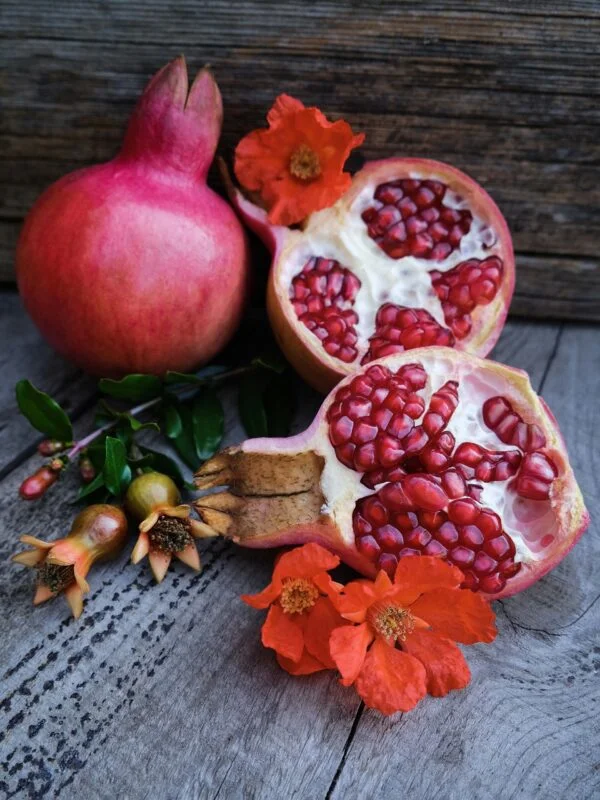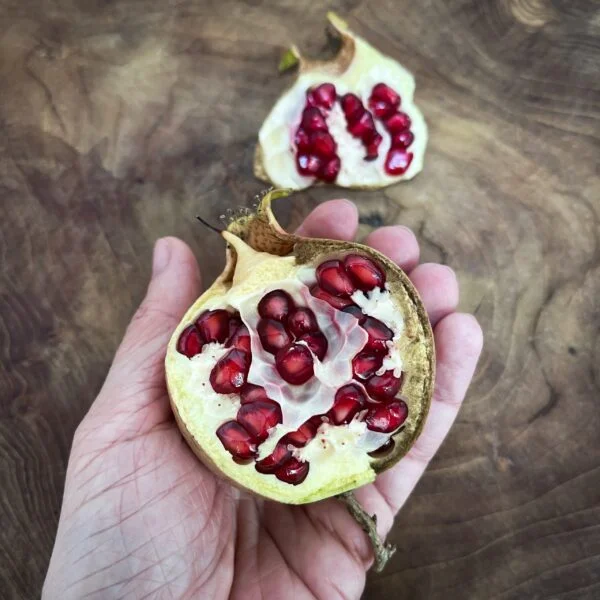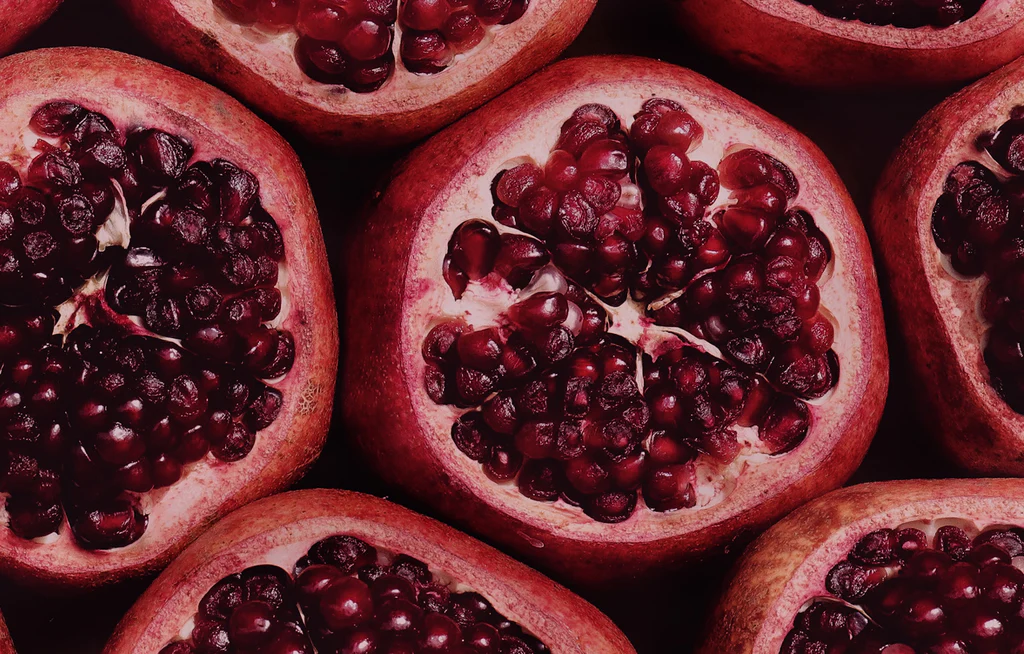
Nutritional Profile: What’s Inside a Pomegranate?
Understanding its nutrition helps explain why pomegranate is beneficial.
Here is a snapshot:
-
One whole pomegranate (~282 g) provides about 234 calories, 4.7 g protein, 3.3 g fat, 52.7 g carbohydrates (including 11.3 g fiber)
-
In a 1‑cup serving of arils: ~144 calories, 2.9 g protein, ~6.96 g fiber, 32.6 g carbs, 17.74 mg vitamin C, 410 mg potassium, folate, vitamin K, vitamin E, and small amounts of minerals like magnesium and phosphorus.
-
A 100 g portion: around 83 kcal, 4.0 g fiber, 18.7 g carbohydrates, and ~10.2 mg vitamin C
-
It is low in fat, low in sodium, and has no cholesterol.
Because of this nutrient mix — fiber, vitamins, minerals, and potent antioxidants — pomegranate is much more than just a tasty fruit.
Health Benefits of Pomegranate
Here are the major scientifically supported benefits of pomegranate, with explanations:
1. Rich Source of Antioxidants & Polyphenols
Pomegranate contains powerful antioxidants such as punicalagins, ellagitannins, and anthocyanins (the pigments that give red color). These neutralize free radicals in the body and help protect cells from oxidative damage.
2. Anti‑Inflammatory Properties
Chronic inflammation is tied to many chronic diseases like cardiovascular disease, diabetes, and cancer. Pomegranate’s compounds help reduce biomarkers of inflammation (e.g. C‑reactive protein), and may help modulate inflammatory pathways.
3. Heart & Cardiovascular Health
One of the most well‑studied benefits:
-
Pomegranate consumption has been linked to reduced blood pressure, improved cholesterol profiles (lower LDL, higher HDL), and better arterial health.
-
Some studies show that pomegranate juice can help reduce plaque buildup in arteries (atherosclerosis) and improve endothelial function (how well blood vessels dilate).
-
In lab/animal studies, LDL (“bad cholesterol”) was reduced by about 39% and HDL (“good cholesterol”) increased by ~27%.
4. Digestive & Gut Health
Because pomegranate is a good source of dietary fiber, it helps support digestion, promotes regular bowel movements, and nourishes beneficial gut bacteria.
Additionally, its antioxidant compounds may protect the digestive tract from inflammation and support gut barrier health.
5. Anti‑Cancer Potential
Some experimental (in vitro and animal) studies indicate that pomegranate extracts can inhibit tumor growth and slow cell proliferation in cancers such as breast, prostate, and liver cancer. However, human clinical evidence is still limited — so it’s not a cure, but a promising complementary agent.
6. Brain & Memory Support
Pomegranate’s antioxidants may help protect against neurodegenerative diseases, reduce oxidative stress in the brain, and improve memory and cognitive function. Some small human and animal studies found positive effects in memory and delay of age-related decline.
7. Skin & Anti‑Ageing Effects
Because skin is often a direct target of oxidative stress (sun, pollution), the antioxidant and anti‑inflammatory activity of pomegranate helps protect the skin, supports collagen formation, and may slow skin aging, wrinkles, or sun damage.
8. Immune Support & Antimicrobial Effects
Pomegranate contains vitamin C and other immune‑supporting micronutrients. It also shows some antibacterial, antiviral, and antifungal properties in lab studies, potentially helping to prevent or modulate infections.
9. Exercise Performance & Recovery
Some evidence suggests that dietary nitrates and compounds in pomegranate can help improve endurance, reduce fatigue, and blunt muscle soreness after intense exercise.

How to Use Pomegranate & Practical Tips
Choosing & Storing
-
Pick a pomegranate that feels heavy for its size and has relatively smooth, intact skin (no large blemishes).
-
Whole pomegranates can be stored in a cool, dry place for a few weeks, or refrigerated for longer shelf life.
-
Once seeds/arils are extracted, store them in airtight containers in the refrigerator for up to ~1–2 weeks. You can also freeze them.
-
Juice can be made fresh, but note that pure juice loses fiber and some nutrients.
How to Open & Extract Seeds
-
Score around the crown and cut off the top.
-
Slice the skin into segments (like peeling apart sections).
-
Submerge the segments in a bowl of water and gently pry the arils (seeds) out — they sink, while the white pith floats, making separation easier.
-
Drain, and enjoy or juice the seeds.
Ways to Enjoy Pomegranate
-
Eat raw arils by the handful
-
Sprinkle over salads (fruit or green salads)
-
Add to yogurt, oatmeal, or smoothie bowls
-
Use pomegranate juice (100%, unsweetened) as a drink or in sauces/marinades
-
Incorporate into desserts (popsicles, jellies)
-
Use pomegranate molasses (reduced sweetened juice) in Middle Eastern dishes
Dosage & Considerations
-
There is no single “official” recommended dose. Many studies use anywhere from ~100 mL to 300 mL of pomegranate juice daily, or comparable aril amounts.
-
Because of its natural sugars, people with diabetes or glucose issues should monitor portion sizes.
-
Interactions: Pomegranate may interact with certain medications (e.g. blood pressure drugs, statins, or anticoagulants) — always consult a healthcare professional before using concentrated extracts or if you are on medication.
-
Allergies: Though rare, some people may have sensitivity.
-
Overconsumption might cause digestive discomfort (gas, bloating) due to fiber and sugar content.

SEO Keywords & Phrases to Use
To make your article more Google‑indexable, include these naturally in your headings or text:
-
pomegranate benefits
-
pomegranate nutrition facts
-
health benefits of pomegranate
-
pomegranate antioxidants
-
pomegranate juice vs seeds
-
how to eat pomegranate
-
pomegranate side effects
-
pomegranate for heart health
-
pomegranate for skin
Also be sure to use internal headings (H2 / H3 tags) like “Health Benefits,” “Nutrition Facts,” “Usage Tips,” etc. Use synonyms and related terms (e.g. “anar,” “ruby fruit,” “superfruit”) to catch variant search traffic.
Sample Outline / Suggested Structure
-
Introduction & Tagline
-
Nutritional Profile
-
Health Benefits (subsections)
-
How to Use / Eat / Store
-
Practical Tips & Warnings
-
Conclusion / Call to Action
Conclusion
Pomegranate is truly a nutrient-dense, antioxidant-rich superfruit that offers a wide spectrum of health benefits — from heart and brain support to improved digestion, skin health, and possible anti‑cancer effects. While it is not a silver bullet, incorporating pomegranate (fresh seeds or 100% juice) into a balanced diet can be a smart, tasty way to boost your overall wellness.

You must be logged in to post a comment.